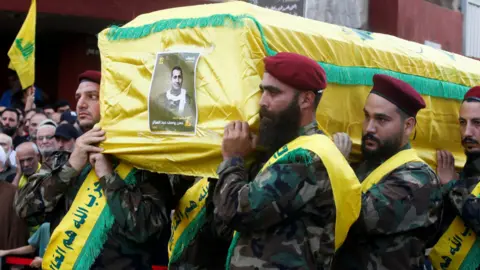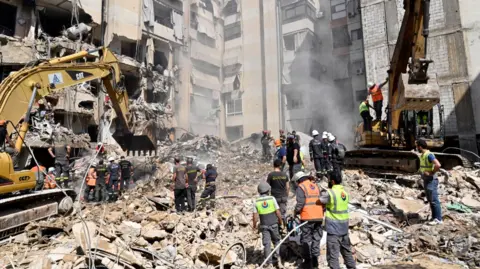The number of people killed in an Israeli airstrike in Beirut on Friday has risen significantly, Lebanese officials say, with several children and women among the dead.
All day on Saturday, rescuers searched through the rubble after a high-rise building collapsed and others were partially destroyed in the attack.
Excavators were brought in to help clear the debris as medical staff surveyed the scene and people waited for news of those who were still missing.
The attack, which hit the densely populated neighbourhood of Dahieh, a Hezbollah stronghold in southern Beirut, killed at least 37 people, including three children, and wounded 68 others, Lebanon’s health ministry said.
The airstrike was Israel’s third on the Lebanese capital this year and has been seen as a major escalation in the region that has added to fears of an all-out war. A senior UN official, Rosemary Di Carlo, warned that the Middle East was at risk of a conflict that could “dwarf” the devastation witnessed in the region so far.
Hezbollah, the powerful Iranian-backed militia and political group, confirmed the death of Ibrahim Aqil, a senior commander in the group’s elite Radwan forces. The group also confirmed that Ahmed Wahbi, himself a top Radwan figure, died in the attack.
Reacting to the attack, the Lebanese health minister, Dr Firass Abiad, said it was a “violation of international humanitarian law”.
“The fact is that those children and those women who were killed were not members of Hezbollah,” he said. “Those were civilians that happened to be nearby”.
 Reuters
ReutersIsrael’s military issued an update on Friday’s strike in southern Lebanon, saying it had killed a dozen senior commanders in Hezbollah’s elite Radwan force.
In what it described as a “precise strike”, the Israel Defense Forces (IDF) said those targeted in Beirut had been meeting in Dahieh, a known stronghold of the Iran-backed group in the Lebanese capital.
In a separate post on X, an IDF spokesperson added 12 of those killed in the Beirut strike were senior members of the Iran-backed group at the “top of Hezbollah’s leadership”.
 EPA
EPAIn addition to the death of Aqil, Hezbollah also confirmed that Ahmed Wahbi, himself a top Radwan figure, died in the attack that hit the densely populated Dahieh area – a stronghold of the group.
How Hezbollah is going to respond isn’t clear. It doesn’t want to spark a wider war with Israel.
Hezbollah’s main supporter, Iran, does not want a major confrontation either.
But the latest air strikes happened days after a wave of explosions of pagers and walkie-talkies used by the group killed dozens, wounded thousands more and caused panic in a country already exhausted by almost one year of conflict.
From the device explosions on Tuesday and Wednesday, 152 people are still in a critical condition and 777 more being treated in hospital for their wounds, Dr Abiad said.
The number of those killed over the two days of explosions has risen to 39.
Twelve people were killed in Tuesday’s attack, while the number of those killed on Wednesday is up to 27, he added.
On Thursday, Hezbollah leader Hassan Nasrallah blamed Israel for attacks, saying it had crossed “all red lines” and vowed “just punishment”.
Israel has not claimed responsibility.
UN human rights chief Volker Türk said the pager and walkie-talkie explosions this week in Lebanon violated international humanitarian law.
Cross-border fighting between Israel and Hezbollah escalated on 8 October 2023 – the day after the unprecedented attack on Israel by Hamas gunmen from Gaza – when Hezbollah fired at Israeli positions in solidarity with the Palestinians.
Since then, hundreds of people, most of them Hezbollah fighters, have been killed in the cross-border fighting, while tens of thousands have also been displaced on both sides of the border.
Israel recently added the return of people displaced from the north of the country to its list of war goals.
Defence Minister Yoav Gallant said on Thursday Israel was entering a “new phase of the war”, concentrating more of its efforts on the north.
















Leave a comment